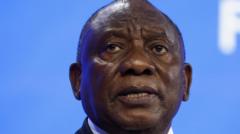Recent comments from President Trump regarding South Africa's land reform policies have ignited debate over the nation's historical injustices and modern governance. Last month, South African President Cyril Ramaphosa enacted a law enabling land seizures without compensation, aimed at addressing longstanding discrepancies since apartheid ended 30 years ago. Trump announced via social media that he would be cutting off all future funding to South Africa pending an investigation into the land confiscation allegations and the treatment of certain demographics.
Trump's Threat to Cut South Africa's Funding Due to Land Reform Controversy

Trump's Threat to Cut South Africa's Funding Due to Land Reform Controversy
In response to South Africa's new land reform law, President Trump threatens to withdraw financial support, sparking a diplomatic row.
In his remarks, Trump criticized the South African government, suggesting their leadership is engaging in "horrible" actions. He framed the matter as an urgent issue, proposing that the U.S. would reassess its relationship with South Africa based on the results of the investigation. South African officials, including International Relations Minister Ronald Lamola, expressed hopes that Trump's advisors would take the time to understand the complexities of South Africa’s constitutional democracy before passing judgment.
The U.S. had allocated approximately $440 million in aid to South Africa for 2023, with South African government representatives assuring that the new law would not facilitate arbitrary land seizures. They emphasized that any expropriation would require prior negotiation with landowners and must align with public interest. Nonetheless, concerns persist regarding potential negative outcomes reminiscent of Zimbabwe's historical economic declines following similar land reforms.
As this situation develops, it reflects broader global discussions on land rights, historical injustices, and the impacts of international relations on domestic policy decisions.
In summary, Trump's stance on South Africa's new land reform law signals a significant geopolitical tension rooted in historical issues, with implications for both nations' fiscal relationships.
The U.S. had allocated approximately $440 million in aid to South Africa for 2023, with South African government representatives assuring that the new law would not facilitate arbitrary land seizures. They emphasized that any expropriation would require prior negotiation with landowners and must align with public interest. Nonetheless, concerns persist regarding potential negative outcomes reminiscent of Zimbabwe's historical economic declines following similar land reforms.
As this situation develops, it reflects broader global discussions on land rights, historical injustices, and the impacts of international relations on domestic policy decisions.
In summary, Trump's stance on South Africa's new land reform law signals a significant geopolitical tension rooted in historical issues, with implications for both nations' fiscal relationships.






















